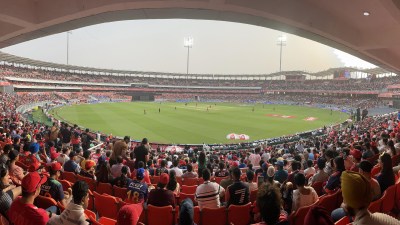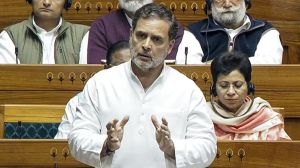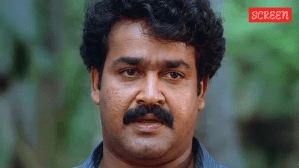Morarji bluster: Will smash Pakistan if it makes nukes
Desai said that if Islamabad built or tried to test a nuclear weapon,India would act to smash it.
As Islamabad scrambled to acquire atomic weapons in the late 1970s,a feckless United States sought to promote regional disarmament in the subcontinent and a naive india underestimated the meaning and consequences of a nuclear Pakistan,according to declassified documents published in Washington last night.
During a one-on-one meeting with then US Ambassador to India Robert Goheen on June 7,1979,Prime Minister Morarji Desai said that if Islamabad built or tried to test a nuclear weapon,India would act to smash it. And Desai dismissed outright a proposal for a pact with Pakistan on the non-use and non-development of nuclear weapons,
In response to a direct question on the possible Indian reaction to Pakistans acquisition of nuclear weapons,Desai turned belligerent,according to Goheens memo to Washington.
When I asked what he proposed to do about the danger,not only to India but more widely should the Pakistanis develop an explosives capability,he said that he proposed to take Zia at his word for now but if he discovered that Pakistan was ready to test a bomb or if it exploded one,he would act at on(c)e To smash it, the account of the conversation reads.
He (Desai) said he had recently assured Pakistan Foreign Secretary Shahnawaz that India had only good intentions towards Pakistan and wished to do nothing to cause it difficulties,but also said that If Pakistan tries any tricks,we will smash you, the declassified cable reads.
Morarjis bluster about smashing Pakistans nuclear programme might sound very muscular. It was anything but.
As a self-proclaimed Gandhian,Desai was opposed to India developing nuclear weapons and was critical of his predecessor Indira Gandhis decision to conduct a nuclear test in May 1974.
Desai deliberately put the strategic elements of Indias nuclear programme on the backburner after he took charge of the nation in March 1977. And he was proud of it. As he rejected Goheens proposal for a joint affirmation with Pakistan not to develop nuclear weapons,Desai pointed out that he had already given such a pledge
unilaterally.
If Pakistan did the same,Desai told Goheen,the two pledges would be as good as a joint agreement.
Desai was also quite naive in believing that the Pakistani leaders would take at face value the Indian governments goodwill,undoubtedly genuine,towards Islamabad.
Much like the US,the Indian intelligence too was picking up signals of an accelerated nuclear weapons programme in Pakistan at the end of the 1970s. Yet it was very difficult to convince Desai and his colleagues,including his foreign minister Atal Bihari Vajpayee,that India must respond.
For all his talk about smashing a nuclear Pakistan,India took too long to make up its mind. It took another decade before prime minister Rajiv Gandhi decided in 1989 to build nuclear weapons and Vajpayee declared India a nuclear weapon state in 1998.
And for all its tough talk on non-proliferation in the late 1970s,Washington was scratching its head on how to deal with the emergence of a nuclear Pakistan,according to the declassified documents. The Soviet invasion of Afghanistan at the end of 1979,removed what little incentive there was for the United States to press Pakistan to reverse its nuclear weapons programme.
- 01
- 02
- 03
- 04
- 05































